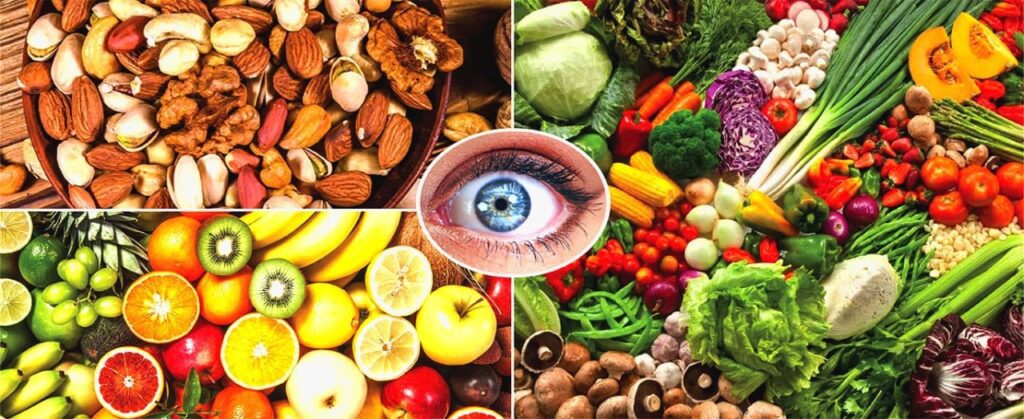
Our eyes are one of the most vital sensory organs, enabling us to interact with and interpret the world around us. Maintaining their health should be a top priority. However, with the rise of digital screen use and environmental pollution, our eyes are often subjected to strain and damage. This is where proper nutrition, particularly vitamins for eye health, plays a critical role. Certain vitamins help preserve vision, reduce the risk of eye diseases, and promote overall eye health.
Let’s delve deeper into the essential vitamins that can enhance your vision naturally, their specific benefits, and the best food sources for each.
Vitamin A: The Vision Protector
Vitamin A is arguably the most well-known vitamin for eye health. It plays a vital role in maintaining the retina’s function, particularly the rods, which help us see in low light.
Benefits:
Prevents night blindness.
Reduces the risk of age-related macular degeneration (AMD).
Supports the production of pigments in the retina that allow proper vision.
Best Food Sources:
Carrots, sweet potatoes, and butternut squash (rich in beta-carotene, which converts to Vitamin A).
Leafy greens like spinach and kale.
Animal-based sources such as liver, eggs, and fortified dairy products.
Vitamin C: A Shield Against Eye Diseases
Vitamin C is a powerful antioxidant that protects the eyes from harmful free radicals, which can damage eye cells and tissues over time.
Benefits:
Reduces the risk of cataracts by slowing their progression.
Strengthens blood vessels in the eyes, reducing the risk of macular degeneration.
Promotes collagen formation, essential for maintaining corneal structure.
Best Food Sources:
Citrus fruits like oranges, lemons, and grapefruits.
Bell peppers, strawberries, and kiwis.
Broccoli and Brussels sprouts.
Vitamin E: Combatting Oxidative Stress
Vitamin E is another antioxidant powerhouse that helps combat oxidative stress in the eyes, which can lead to cell damage.
Benefits:
Protects the eyes from free radical damage.
Reduces the risk of cataracts and AMD.
Best Food Sources:
Nuts and seeds such as almonds, sunflower seeds, and hazelnuts.
Vegetable oils, including sunflower and safflower oil.
Spinach and other leafy greens.
Lutein and Zeaxanthin: Natural Blue Light Filters
Although technically not vitamins, lutein and zeaxanthin are essential carotenoids that support eye health. These pigments are concentrated in the macula, the part of the retina responsible for central vision.
Benefits:
Protect the eyes from harmful blue light emitted by screens and devices.
Reduce the risk of macular degeneration and cataracts.
Best Food Sources:
Kale, spinach, and collard greens.
Corn, peas, and broccoli.
Egg yolks.
Vitamin D: Beyond Bone Health
Vitamin D is often associated with bone health, but it also plays a crucial role in maintaining eye health.
Benefits:
Reduces the risk of dry eye syndrome by supporting tear production.
May lower the risk of macular degeneration.
Best Food Sources:
Fatty fish like salmon, mackerel, and sardines.
Fortified foods such as milk and orange juice.
Sunlight exposure, which helps the body synthesize Vitamin D naturally.
B Vitamins: Eye Health Multipliers
The B-vitamin family, particularly B6, B9 (folic acid), and B12, offers a variety of eye health benefits.
Benefits:
Reduce levels of homocysteine, an amino acid that increases the risk of AMD.
Prevent eye-related complications in individuals with diabetes.
Best Food Sources:
Whole grains, fortified cereals, and legumes.
Poultry, eggs, and dairy products.
Leafy greens and bananas.
Omega-3 Fatty Acids: Supporting Tear Production
While not a vitamin, omega-3 fatty acids deserve a mention for their immense benefits for eye health.
Benefits:
Alleviate symptoms of dry eye syndrome.
Support retinal function and reduce inflammation in the eyes.
Best Food Sources:
Fatty fish like salmon, tuna, and trout.
Walnuts, chia seeds, and flaxseeds.
Fish oil supplements.
Zinc: The Vision-Enhancing Mineral
Zinc works synergistically with vitamins to maintain optimal eye health. It helps transport Vitamin A from the liver to the retina and supports the production of melanin, a protective pigment in the eyes.
Benefits:
Improves night vision.
Reduces the risk of AMD and cataracts.
Best Food Sources:
Oysters, crab, and lobster.
Beef, pork, and poultry.
Legumes, nuts, and seeds.
Tips for Incorporating Eye-Healthy Vitamins into Your Diet
1. Follow a Rainbow Diet: Include a variety of colorful fruits and vegetables in your meals to ensure you get a broad spectrum of nutrients.
2. Choose Whole Foods: Prioritize natural food sources over supplements, unless prescribed by a healthcare provider.
3. Stay Hydrated: Proper hydration is essential for maintaining healthy eyes and preventing dryness.
4. Limit Processed Foods: Minimize consumption of sugary and processed foods that can counteract the benefits of eye-healthy nutrients.
5. Consult a Specialist: If you have specific concerns about your vision, consult an eye care professional for personalized advice.
Proper nutrition, including an adequate intake of vitamins for eye health, is the cornerstone of maintaining clear vision and preventing common eye conditions. By prioritizing foods rich in these essential nutrients, you can take a proactive step toward safeguarding your eyesight for years to come.
